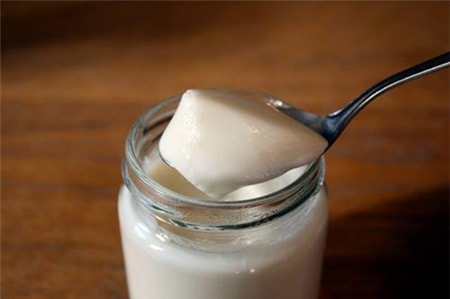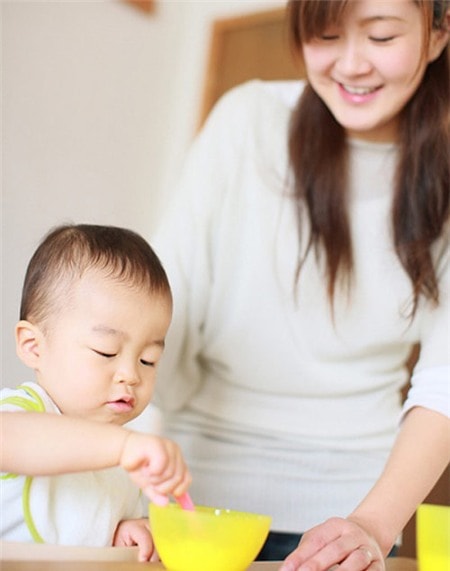Blameworthy mistakes when feeding children yogurt
Everyone knows the effects and importance of yogurt in supporting digestion and supplementing calcium for children.
However, not all mothers know how to feed their children and how much to feed them. This dish seems simple and familiar, but if you don't know how, you can completely lose the nutritional value of yogurt. Here are 6 misconceptions that mothers have when feeding their children yogurt.
Boxed yogurt and liquid yogurt are the same.
Currently on the market, in addition to yogurt fermented from whole milk packaged in flexible boxes, there are also many types of liquid yogurt commonly known as "fermented milk drinks". Liquid yogurt is mainly composed of cow's milk or milk powder, sugar, acid, lemon acid or apple acid, flavoring, preservatives, etc. Many parents believe that yogurt and liquid yogurt are both good for children's health.
However, in reality, the nutritional value of these two types of yogurt is completely different. The nutrition in liquid yogurt is only 1/3 compared to pure yogurt, so they cannot be used interchangeably.
The thicker the yogurt, the better.
Most mothers believe that the thicker the yogurt, the better. But in fact, concentrated yogurt is often supplemented with substances such as hydroxypropyl starch phosphate, pectin, gelatin, which are not good for children's health. Except for the yogurt boxes that mothers make for their children, the concept that the thicker the yogurt, the better is wrong.
 |
| Except for homemade yogurt, the thicker the boxed yogurt, the better it is for children (illustrative photo) |
Yogurt can be fed to children freely without any problem.
Many parents believe that yogurt is a 'miracle drug' for the digestive system, so they let their children eat it whenever they want. In fact, this is a completely wrong concept. If children eat too much, it will affect the secretion of solvents in the stomach, reduce appetite and cause stomach cramps. Children with diarrhea should also "abstain" from yogurt until their stomachs are stable.
The appropriate amount of yogurt per day according to a child's age is:
- Children under 1 year old eat 50 - 100ml
- Children 2 - 3 years old: 100 - 200ml
- From 3 years old and up: 200 - 300ml
Note: If your child eats a lot of yogurt, reduce the amount of liquid milk.
Warm the yogurt before feeding your baby.
Because they are afraid that their children will get a sore throat if they eat cold yogurt, some mothers have the habit of heating yogurt in the microwave or immediately dipping it in boiling water when taking it out of the refrigerator.
In fact, the microwaves in the microwave will destroy the beneficial bacteria and proteins in the yogurt. Too hot a soaking water will also affect these bacteria.
The best way is for mothers to take the yogurt out of the refrigerator about 45 minutes before feeding the baby, or they can soak it in warm water according to the formula 2 boiling 1 cold and stir to cool the yogurt evenly before feeding the baby.
Yogurt is also made from fresh cow's milk, why can children under 1 year old eat yogurt but not cow's milk?
This question is a big concern for many women. The reason is that fresh cow's milk does not have enough essential nutrients that breast milk and/or formula milk provides. Therefore, experts do not want mothers to replace breast milk or formula milk with fresh cow's milk too soon. On the other hand, yogurt, like cheese, must go through a culture process that breaks down milk proteins before becoming a finished product. This makes yogurt easier to digest and less likely to cause allergies.
Yogurt can be combined with all kinds of foods.
 |
| Yogurt cannot be freely mixed with all kinds of food (illustrative photo) |
Yogurt combined with some other foods will bring better flavor. However, you should not combine yogurt with some antibiotics such as chloramphenicol, erythromycin, they can kill or destroy lactobacillus bacteria in yogurt. Processed foods such as sausages, smoked meat, frozen foods made from meat should not be fed to babies with yogurt because they can cause constipation, stomach pain, even death. In return, yogurt is very suitable for starchy foods for breakfast such as rice, noodles, dumplings, bread... Mom can also try mixing yogurt with:
- Apples; peaches; bananas, sweet potatoes, avocados, pumpkins
Should eat yogurt before meals
Some mothers believe that feeding yogurt before meals will help their babies eat more and digest better. But this will make the yogurt lose its effectiveness because the lactic bacteria in the milk are destroyed by gastric juice.
The best time to feed your child yogurt is after a main meal, after taking medicine… about 2 hours. At this time, the bacteria in yogurt will have the most suitable environment, contributing to digesting food and absorbing nutrients effectively.
Before going to bed is also a good time because eating yogurt at this time not only helps children get nutrition but also aids digestion and brings good sleep.
According to Discovery






